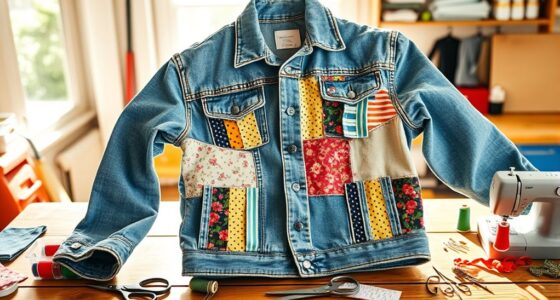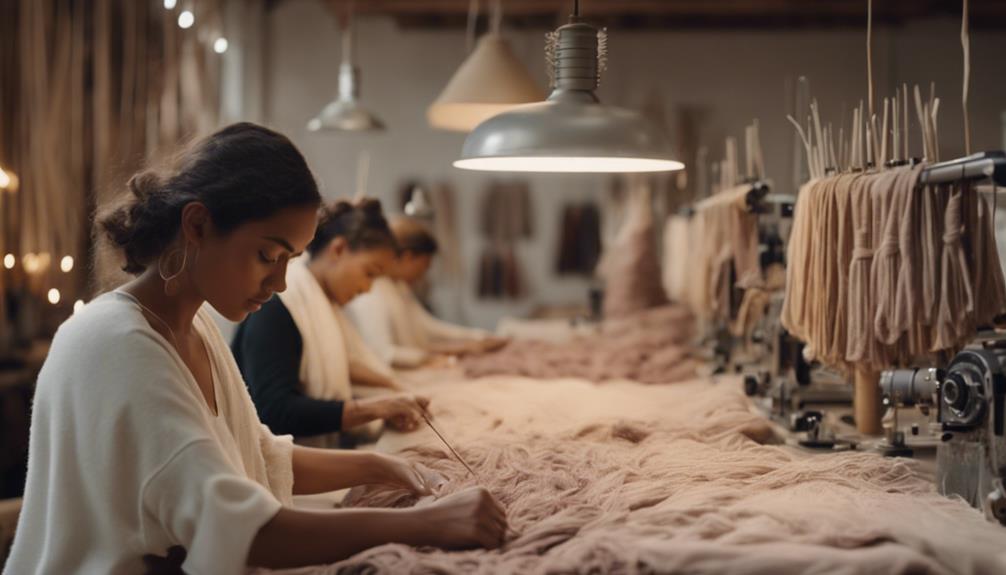Slow fashion promotes purchasing high-quality, long-lasting clothing pieces, advocating for buying less but choosing better. Ethical fashion places importance on fair labor practices, ensuring workers are provided with safe working conditions and fair wages. Sustainable fashion, on the other hand, focuses on reducing environmental impact by using eco-friendly materials and processes. Each concept plays a crucial role in reshaping your fashion choices, addressing various issues such as labor rights, environmental concerns, and conscious consumption. Understanding these distinctions will help you see how each approach contributes to a more sustainable fashion industry that encourages informed decision-making.
Key Takeaways
- Slow fashion emphasizes quality and longevity of garments, prioritizing timeless designs over fleeting trends.
- Ethical fashion focuses on fair labor practices, ensuring safe working conditions and fair wages for garment workers.
- Sustainable fashion aims to reduce environmental impact through eco-friendly materials and sustainable production processes.
- While slow fashion promotes mindful consumption, ethical fashion raises awareness of labor conditions, and sustainable fashion encourages eco-consciousness.
Defining Slow Fashion
Slow fashion is a movement that prioritizes quality and sustainability over the rapid turnover of trends found in fast fashion. By embracing slow fashion, you're choosing to invest in timeless designs that outlast fleeting fads. This approach encourages you to form a personal relationship with your wardrobe, leading to more thoughtful purchases and reduced waste.
In slow fashion, craftsmanship takes center stage, with many garments being handcrafted and made from local resources. This not only supports fair labor practices but also fosters a deeper appreciation for the skills behind the clothing you wear. By focusing on quality over quantity, slow fashion minimizes the environmental impact associated with mass production and seasonal trends.
When you adopt slow fashion principles, you're considering the entire lifecycle of a product, from sourcing materials to its eventual disposal. This intentional approach to consumption benefits both people and the planet.
Understanding Ethical Fashion

Understanding ethical fashion means recognizing the importance of fair labor practices within the garment industry.
You'll see how prioritizing fair wages and safe working conditions not only benefits workers but also has a broader social impact.
Definition of Ethical Fashion
Ethical fashion prioritizes fair treatment of workers in the garment industry, ensuring they receive fair wages and work in safe conditions while advocating against child labor. It's not just about stylish clothes; it's about creating a system that respects human rights.
You should know that a staggering 85% of garment workers in the Global South are women, making it essential to address gender equity and protect against gender-based violence in the fashion supply chain.
Moreover, many garment workers earn as little as $4.66 per hour, which is far below the federal minimum wage. This highlights the urgent need for ethical pay practices.
Ethical fashion also tackles environmental issues, as toxic emissions from factories harm both the planet and the health of workers.
Transparency in production processes is another key element. When brands are open about their practices, it fosters accountability and allows you to make informed choices that align with your values regarding human rights and labor practices.
Ultimately, ethical and sustainable fashion go hand in hand, pushing the industry towards a more equitable future for everyone involved.
Importance of Fair Labor
Fair labor practices are essential in ensuring that garment workers are treated with dignity and respect, reflecting the broader principles of ethical fashion. When you support ethical fashion, you contribute to a movement that champions fair wages and safe working conditions.
Here are three key reasons why fair labor matters:
- Empowerment of Workers: Fair wages enable workers, especially women who make up 85% of the garment workforce, to support themselves and their families, fostering economic independence.
- Prevention of Exploitation: Ethical fashion combats the unsafe working conditions and human rights violations rampant in the industry. By choosing brands that prioritize fair labor, you're helping to eliminate practices that exploit vulnerable populations.
- Transparency in Supply Chains: Ethical brands advocate for transparent supply chains, ensuring that consumers know where their clothing comes from and how workers are treated. This awareness encourages companies to adopt better practices.
Social Impact of Practices
The social impact of fashion practices extends far beyond the clothing you wear, directly affecting the lives of workers and communities involved in production.
Ethical fashion aims to rectify these issues by promoting fair labor practices, ensuring workers receive fair wages. Unfortunately, many workers earn as little as $4.66 per hour, a stark contrast to the federal minimum wage of $7.25. This exploitation is particularly prevalent in the Global South, where 85% of garment workers are women, highlighting the urgent need for gender equity and protection against human rights violations.
The environmental harm associated with unethical fashion practices also poses significant threats to community health. Toxic factory emissions not only jeopardize worker safety but also endanger those living nearby. The lack of regulation in labor rights further exacerbates these injustices, as high demand for fast fashion fuels unsafe working conditions.
Addressing the intersectionality of social justice and environmental impact is vital. Marginalized communities often bear the brunt of these unethical practices, making it essential for you to support ethical fashion.
Exploring Sustainable Fashion

Sustainable fashion focuses on reducing environmental impacts by using organic, recycled, and upcycled materials to create a more responsible garment industry. It's become essential as the fashion sector accounts for 10% of global greenhouse gas emissions. By embracing sustainable practices, you're contributing to a healthier planet.
Here are three key aspects of sustainable fashion:
- Waste Reduction: Fast fashion generates a staggering 11.2 million tons of textile waste each year. Sustainable fashion advocates for recycling and repair to minimize this waste.
- Ethical Labor Practices: It's not just about materials; sustainable fashion also prioritizes fair working conditions. Eco-friendly fabrics lose their value if produced under exploitative circumstances.
- Lifecycle Perspective: Sustainable fashion considers the entire lifecycle of a garment, from production to disposal. This approach includes second-cycle markets and the biodegradability of clothing.
Key Differences Explained

Understanding the distinctions between slow, ethical, and sustainable fashion helps clarify how each approach contributes to a more responsible garment industry. Here's a breakdown of their key differences: Slow fashion focuses on producing high-quality garments that are meant to last and be worn for a long time, while ethical fashion prioritizes fair labor practices and the humane treatment of workers in the supply chain. On the other hand, sustainable fashion aims to minimize the environmental impact of the entire garment lifecycle, from production to disposal. Understanding the distinctions between ethical fashion vs sustainable fashion is crucial for consumers and industry professionals alike in order to make informed choices and drive positive change in the fashion industry.
| Aspect | Slow Fashion | Ethical Fashion | Sustainable Fashion |
|---|---|---|---|
| Focus | Quality and longevity of garments | Fair labor practices | Environmental impact |
| Production | Handcrafted, low volume | Fair wages, safe working conditions | Resource reduction, recycling, waste minimization |
| Impact | Reduces landfill waste | Avoids exploitation and human rights violations | Addresses 10% of global greenhouse gas emissions |
| Consumer Behavior | Encourages mindful purchasing | Promotes awareness of labor rights | Inspires eco-conscious choices |
| Interconnectedness | Must consider ethical and sustainable practices | Needs sustainable materials | Requires fair labor conditions to be truly sustainable |
The Intersection of Concepts
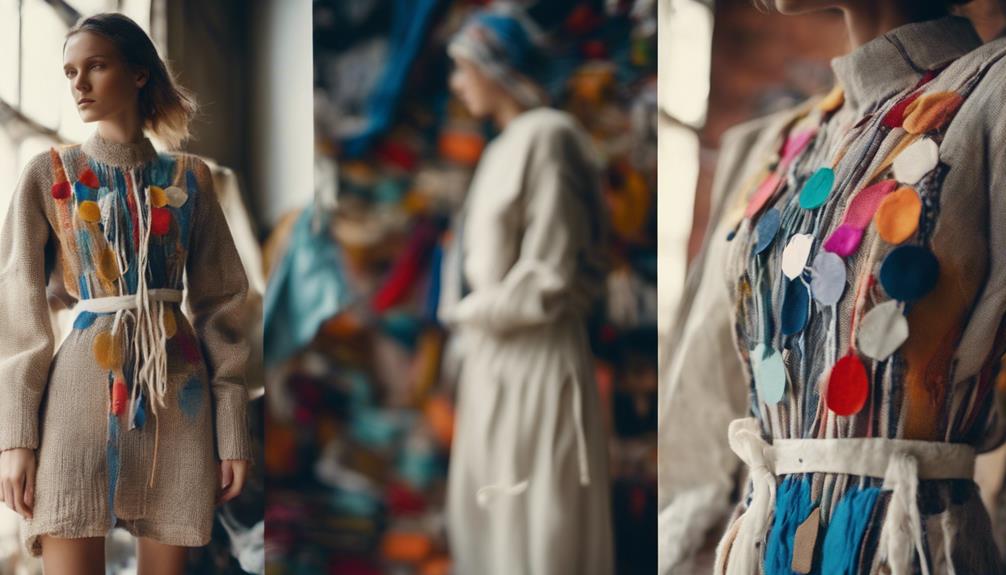
Balancing ethical practices with sustainable initiatives is essential for creating a truly responsible fashion industry. When you consider the intersection of these concepts, it's clear that they complement each other in significant ways.
Here are three key points to remember:
- Worker Rights Matter: Ethical fashion prioritizes fair labor practices, ensuring that workers in the supply chain are treated justly.
- Environmental Impact: Sustainable fashion focuses on minimizing environmental harm, emphasizing the need for eco-friendly materials and processes.
- Inclusivity is Key: Both ethical and sustainable fashion must address the needs of marginalized communities, ensuring that everyone benefits from responsible practices.
Failing to recognize the relationship between these concepts can undermine efforts towards environmental sustainability. For instance, using organic materials produced under exploitative conditions diminishes their value.
Additionally, your choices as a consumer can greatly influence both social justice and the health of our planet. By educating yourself on these interconnected issues, you empower yourself to make informed decisions that support both human rights and environmental protection in the fashion industry.
Embrace the intersection of ethical and sustainable fashion for a brighter future!
Challenges in Fashion Industry
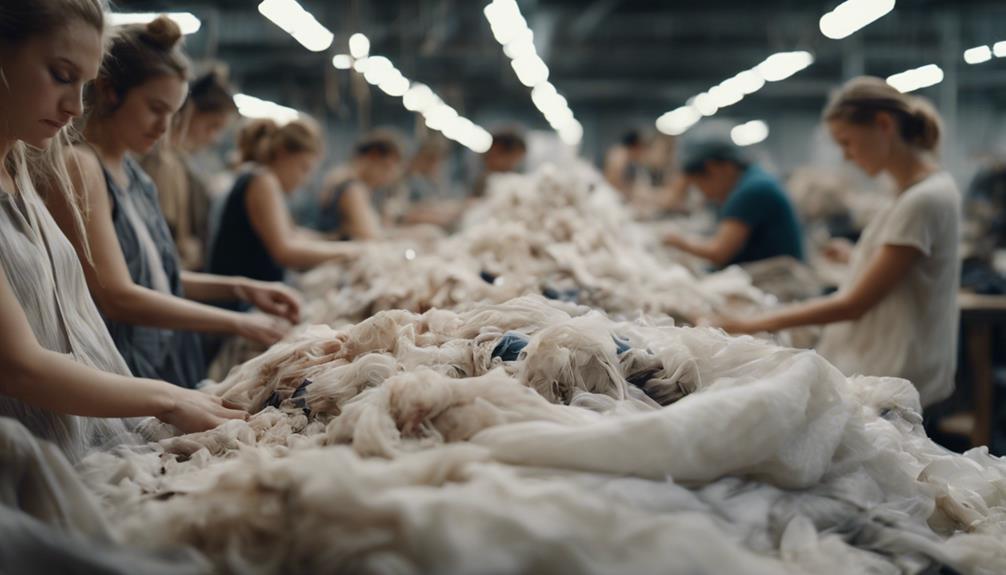
The fashion industry faces numerous challenges that hinder progress toward ethical and sustainable practices, from environmental degradation to labor rights violations. One major issue is the industry's significant contribution to greenhouse gas emissions, accounting for 10% of the global total. Fast fashion exacerbates this problem, generating around 11.2 million tons of textile waste each year, which clogs landfills and harms the environment.
Moreover, the complexity of supply chains complicates efforts for transparency and accountability. Many brands exploit low-wage labor, with reports showing average wages as low as $4.66 per hour, far below the federal minimum wage. This raises serious concerns about fair labor practices and the treatment of workers.
Consumers often encounter greenwashing, where brands falsely claim sustainability without implementing genuine practices. This deceptive marketing makes it difficult for consumers to make informed choices. Additionally, limited access to sustainable options leaves low-income consumers struggling to find ethical fashion choices, further exacerbating inequalities.
It's clear that addressing these challenges is essential for the fashion industry to move toward a more ethical and sustainable future, allowing everyone to participate in conscious consumerism.
Misleading Practices to Watch
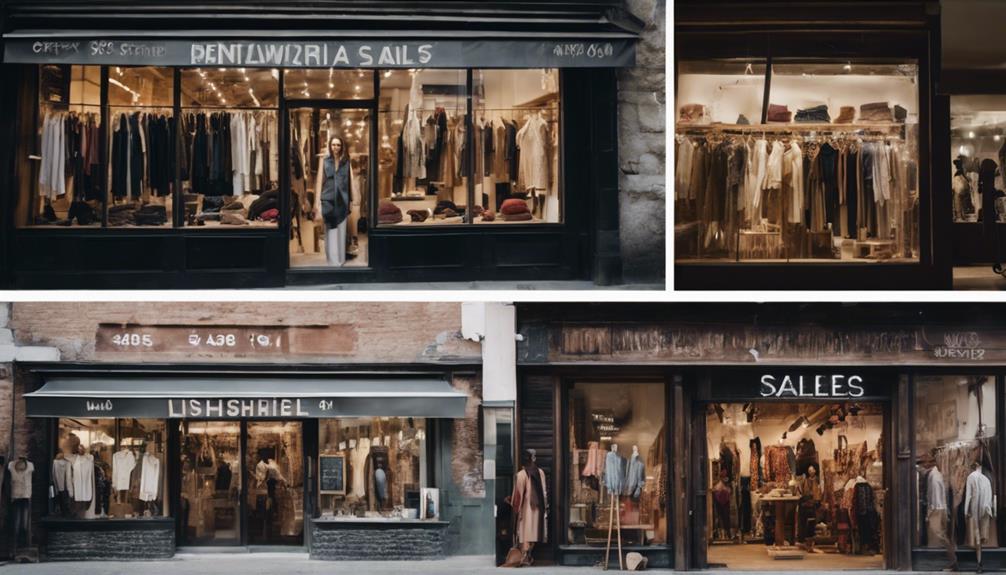
As you navigate the fashion landscape, it's crucial to stay alert for misleading practices that can cloud your judgment about sustainability claims. Many brands engage in greenwashing, making it important to scrutinize their claims.
Here are three common tactics to watch out for:
- Vague Sustainability Claims: Brands often use ambiguous language, like “eco-friendly” or “green,” without providing clear information on their practices or materials.
- Unverified Eco-Labels: Some products flaunt labels that sound sustainable but lack credibility. Always check for third-party certifications that are recognized in the industry.
- Selective Transparency: Brands may showcase one eco-friendly initiative while ignoring harmful practices in other areas of their operations. Investigating a brand's overall supply chain can reveal inconsistencies.
Supporting Ethical Choices

Supporting ethical choices in fashion means actively seeking out brands that prioritize fair labor practices and sustainable production methods. When you research brands, look for those that offer living wages and safe working conditions. It's shocking to know that garment workers can earn as little as $4.66/hour in exploitative environments.
By advocating for policy changes that promote fair labor standards, you can help combat the issues affecting the 85% of women who work in garment manufacturing, often facing human rights violations.
Engaging directly with local artisans and sustainable brands not only reduces your carbon footprint but also supports communities that the fashion industry impacts. By limiting your shopping frequency and participating in clothing swaps, you can considerably cut down on textile waste—approximately 11.2 million tons generated annually by fast fashion.
Additionally, educating yourself and others about the significance of ethical choices raises awareness and empowers informed decisions. Every choice you make can contribute to social justice and sustainable practices in the industry.
Engaging With the Community
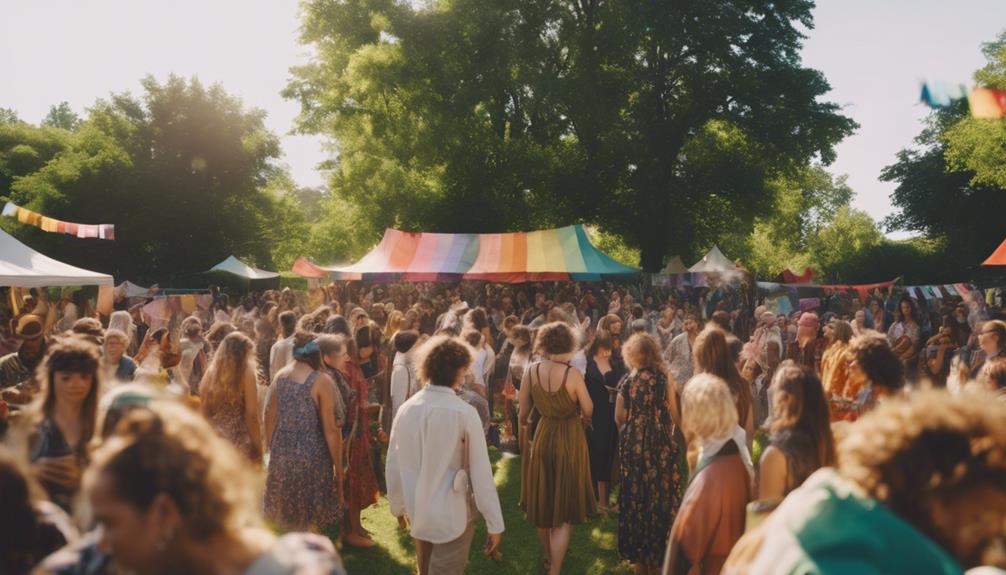
Engaging with your community is key to promoting sustainable fashion.
By participating in local events and fostering dialogue, you can build collaborative networks that amplify your impact.
Together, these strategies not only raise awareness but also encourage brands to adopt ethical practices.
Community Engagement Strategies
Community engagement in sustainable fashion sparks meaningful discussions and fosters awareness about ethical practices, driving collective change in the industry. By adopting effective community engagement strategies, you can create a supportive network that champions sustainable and ethical fashion.
Here are three key approaches you can implement:
- Collaborate with Local Artisans: Partner with local artisans to promote a circular economy. This not only strengthens community ties but also emphasizes shared values of sustainability.
- Participate in Online Platforms: Leverage social media and forums to connect with like-minded individuals. These platforms provide opportunities for dialogue and collaboration around common goals related to ethical and sustainable practices.
- Join Organizations: Align yourself with organizations like Remake that advocate for human rights and climate justice. Being part of a larger movement amplifies your voice and highlights the importance of community-driven efforts in transforming the fashion industry.
Importance of Dialogue
Fostering open dialogue about slow, ethical, and sustainable fashion helps you understand the impact of your choices on people and the planet. Engaging in conversations within the community deepens your awareness of how consumer behavior affects social and environmental issues. By discussing these topics, you can explore innovative solutions and collective actions that combat challenges like greenwashing and unethical labor practices.
Organizations like Remake highlight the necessity of community engagement in advocating for human rights and climate justice in the fashion industry. Sharing your personal experiences and insights on forums and social media strengthens these community efforts, promoting transparency and accountability among brands.
It's through dialogue that you'll discover diverse perspectives and learn about the importance of inclusivity in sustainable fashion. This active participation guarantees that marginalized voices are represented, making the movement more accessible to everyone.
When you engage in meaningful discussions, you contribute to a more informed community that can drive positive change in the fashion industry. Ultimately, your involvement in these dialogues enriches your understanding and empowers you to make choices that align with your values.
Building Collaborative Networks
Building collaborative networks in sustainable fashion enhances your ability to share knowledge and amplify ethical practices across the industry. By connecting with like-minded individuals and organizations, you can drive meaningful change that prioritizes human rights and environmental sustainability.
Here are three ways to engage with the community:
- Join Organizations: Become a part of groups like Remake, which unite changemakers focused on human rights and climate justice. Collaborating within these networks strengthens advocacy efforts.
- Participate in Discussions: Engage in community dialogues about the impacts of fashion choices. Sharing experiences and insights raises awareness and fosters a collective commitment to ethical practices.
- Utilize Online Platforms: Leverage social media and forums to connect with others passionate about sustainable fashion. These tools can help you build relationships and share resources, amplifying your voice in the industry.
Notable Brands to Consider

When exploring notable brands in slow, ethical, and sustainable fashion, you'll find a range of companies committed to environmentally friendly practices and fair labor standards.
Reformation stands out with its Refscale tool, providing transparency about the environmental impact of each product. This helps you make informed choices about your purchases.
Everlane also emphasizes transparency, revealing the costs behind its production processes and ensuring fair labor practices throughout its supply chain.
If you're looking for brands that prioritize organic materials, consider Los Angeles Apparel. They focus on using organic and recycled fabrics while ensuring their workers receive fair wages.
Another great option is People Tree, known for its local craftsmanship and biodegradable materials, aligning perfectly with ethical and sustainable goals.
Lastly, & Other Stories encourages circular fashion through its recycling program, offering discounts when you return used items.
Frequently Asked Questions
What Is the Difference Between Slow, Ethical, and Sustainable Fashion?
You'll find slow fashion emphasizes quality and timelessness, ethical fashion focuses on fair labor practices, and sustainable fashion targets environmental impact. Each approach plays a role in creating a more responsible and conscious fashion industry.
What Is the Difference Between Ethical and Sustainable?
Ethical fashion focuses on fair labor practices and safe working conditions, while sustainable fashion emphasizes minimizing environmental impact. Understanding these differences helps you make informed choices that support both human rights and the planet's health.
What Is Ethical and Sustainable Fashion?
When you embrace ethical fashion, you're supporting workers' rights and safe conditions. Meanwhile, sustainable fashion gently nurtures our planet, using eco-friendly materials and practices. Together, they create a harmonious balance for people and the environment.
What Is the Difference Between Eco Fashion and Sustainable Fashion?
Eco fashion focuses on environmentally friendly materials and practices, while sustainable fashion encompasses both environmental and social aspects, ensuring fair labor and humane treatment throughout the supply chain. Both prioritize transparency and ethical production.
Conclusion
In a world where fast fashion whirls like a tornado, embracing slow, ethical, and sustainable fashion is your way to stand firm like a sturdy oak.
Each choice you make can nurture the planet and support fair labor practices. By understanding these concepts, you're not just buying clothes; you're investing in a brighter future.
So, choose wisely, engage with your community, and let your wardrobe reflect your values. Together, we can sow seeds of change!


